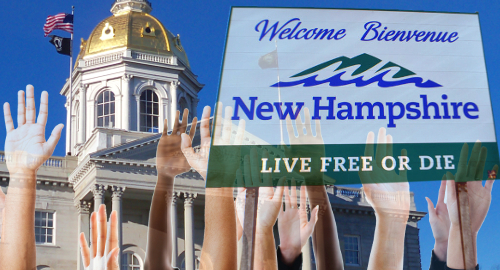 New Hampshire’s sports bettors are but a governor’s signature away from joining the burgeoning ranks of US states with legal wagering markets.
New Hampshire’s sports bettors are but a governor’s signature away from joining the burgeoning ranks of US states with legal wagering markets.
On Thursday, the New Hampshire House of Representatives approved HB480, which will allow the state to offer both land-based and mobile wagering for the first time. The bill was originally approved by the House in March but was tweaked by the state Senate in May, requiring the House to concur with the Senate’s changes.
Concur they did, and now the onus is on Gov. Chris Sununu to sign the bill into law. Sununu has already indicated his support for using some of that sweet, sweet betting cash to plug holes in the state budget, so he’s expected to sign HB480 into law sometime next month.
Once Sununu signs on the dotted line, the New Hampshire Lottery Commission (NHLC), which oversees gambling in the casino-free state, will establish a Division of Sports Wagering to oversee betting activity. The NHLC will then select a maximum of five mobile and up to 10 retail betting operators, with the expectation that legal wagering will be up and running by early 2020.
Assuming Sununu doesn’t disappoint, New Hampshire will join Illinois, Indiana, Iowa, Montana and Tennessee on the list of states that have approved legal wagering in 2019. Other states, most notably New York, are still teetering on the fence as their respective legislative sessions tick away.
DIRTY DATA DEALINGS
New Hampshire’s betting legislation doesn’t require operators to pay the major sports leagues an ‘integrity fee,’ not does it include a requirement to use an official league-supplied data feed. But both Major League Baseball and the National Basketball Association have been playing hardball with US betting operators in order to claim a piece of betting revenue for themselves.
In May, rumors circulated that MLB and the NBA had issued ultimatums to a number of Nevada sportsbooks, to the effect that they either paid up or the leagues would prohibit them from accessing official league data. Word then spread that league-approved data supplier Sportradar had sent letters to its bookmaking clients informing them that it was under NBA orders to cut off any sportsbook that wasn’t an Authorized Gaming Operator of the league.
On Thursday, Sports Handle published details of a pamphlet that an MLB exec had circulated in Nevada touting the benefits of becoming an “official league data licensee.” The pitch reportedly came with a warning: sign up as a licensee before the All-Star Game (July 9) or lose access to MLB data.
The galling aspect of this pitch is that many sportsbooks are already paying a fee for official data through existing deals with companies like Sportradar. So the leagues are being hungry, hungry hippos here, looking for either a fixed fee (which could vary depending on the size of the operator) or a percentage of betting handle.
As for what MLB is offering in return, it basically comes down to use of official logos, trademarks and marketing opportunities, along with slightly more detailed data than is currently available from unauthorized data sources. That will likely change in future, as league-approved wearable devices provide a range of proprietary biometric player data, but that’s a ways down the road just yet.
To date, Illinois and Tennessee are the only states that have included mandatory use of league-supplied data in their betting legislation. The pursuit of an integrity fee has proven an even tougher hill to climb for the leagues, although New York has promised to kick back 0.2% of its betting handle to the leagues, assuming the state actually defies expectations and passes their legislation.